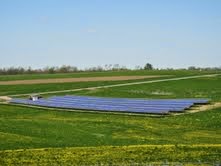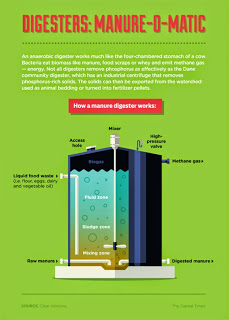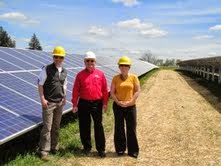
by jboullion | May 27, 2014 | Uncategorized
These two arrays are located near each other in the City of Westby, where Vernon Electric Cooperative is located. Both were energized last week and are now generating electricity right in town. The larger of the two, owned by Colorado-based Clean Energy Collective (CEC), serves Dairyland Power Cooperative. With a rated capacity of 517 kilowatts, this is the fifth largest solar electric installation in Wisconsin. The other, also owned by CEC, serves Vernon Electric Cooperative (VEC). With a rated capacity of 305 kilowatts, this is the eighth largest solar electric installation in Wisconsin. It is also the state’s first community solar project.
These new arrays raise the total amount of operating solar generating capacity in Wisconsin to 16 MW.
The individuals standing inside the 517 kilowatt array serving Dairyland Power Cooperative are Dave Maxwell, VEC’s Marketing & Communications Director, Joe McDonald, VEC’s CEO & General Manager, and Holly O’Higgins, Energy Analyst, Wisconsin State Energy Office.
by jboullion | May 22, 2014 | Uncategorized
Midwest Energy News published an article today highlighting the political challenges facing small-scale renewable energy projects in Wisconsin.
Innovative Farm Energy Projects Clash with Wisconsin Policy
Published by Midwest Energy News on 05/22/2014 by Kari Lydersen
The farming region of central Wisconsin presents a bucolic image, home to rolling fields, numerous dairies and a family-owned chicken processing plant that started in 1925 with two brothers delivering eggs and livestock.
These operations also produce a lot of waste, including countless tons of manure and the detritus from processing poultry.
Now Chester Dairy and Brakebush Brothers are teaming up through a Milwaukee-based company to turn that unsightly waste into renewable heat and power.
Clean Energy North America is building a biodigester on New Chester’s land, which will extract methane from the dairy’s manure and from the waste of nearby food processors including Brakebush. The biogas will be sent via an underground pipeline to Brakebush’s plant about 16 miles away. There it will be burned to generate up to 7 MW of electricity, supplying more than 80 percent of Brakebush’s load. And the waste heat from the generation will be used for Brakebush’s hot water.
That means Brakebush– a national company that distributes chickens to schools, restaurants and the military — will drastically reduce its need for natural gas for heating and electricity from the grid that would likely come from coal-fired power plants. And the manure and other waste will be turned into an efficient fertilizer, reducing the problems posed by bacteria and run-off when manure is applied directly to fields.
This project, called New Chester Clean Energy, is an example of the creative renewable energy and combined heat and power operations that could help farms across the Midwest save on energy costs and reduce their environmental impact and carbon footprint.
But such projects depend on a favorable climate from local utilities and state regulators and legislators.
Wisconsin is not considered politically hospitable to distributed renewable energy projects like this, as outlined in a report last year by the Wisconsin Energy Institute. Clean Energy North America vice president Murray Sim, an expert who has worked at utilities in the Midwest and abroad, said the company will likely not do another such project in the state anytime soon.
Read More…
by jboullion | May 13, 2014 | Uncategorized
Today, RENEW Wisconsin Executive Director, Tyler Huebner, will be taking a tour of the new Badger Hydro project.
From a press release issued by the project’s general contractor, the Boldt Company:
“Kaukauna Utilities, The Boldt Company, AECOM and Voith Hydro will celebrate the future of hydroelectric power at a dedication ceremony for the utility’s new Badger Hydro project on May 13, 2014. The Badger Hydro project is a $38 million, long-term investment to replace two hydro plants that had been in operation for more than 100 years. The project also involved the first major reconstruction of the power canal, which had been in existence for more than 130 years.”
For more information on the project, see the Badger Hydro website.
by jboullion | May 13, 2014 | Uncategorized
From the LaCrosse Tribune, April 5, 2014:
The Coulee Region could save millions of dollars a year in energy costs, create more than a hundred jobs and slash carbon dioxide emissions by creating a market for wood pellet fuel, according to new study.
Read more
by jboullion | May 9, 2014 | Uncategorized
By Thomas Content of the Journal Sentinel
May 8, 2014
A Menomonee Valley solar panel factory won’t reopen, after its new Chinese owner decided to open a plant instead in North Carolina, a local economic development official said.
Helios Solar Works filed for receivership, a process similar to bankruptcy, late last year.
A Chinese company, Chinaland Solar Energy, bought the company’s assets during the receivership proceeding. At the time, the Chinese firm indicated that it wanted to reopen the Milwaukee plant.
But the company’s representatives recently informed the Milwaukee 7 economic development group that they will instead open a factory in North Carolina, said Jim Paetsch, Milwaukee 7’s vice president of corporate relocation and expansion.
Read the rest of the story…

by jboullion | May 6, 2014 | Uncategorized
Jessica Vanegeren – Part of the “Murky Waters” investigative series, published by the Capital Times, April 30, 2014
It is no secret that cows produce two things in abundance in the Dairy State: milk and manure.
Wisconsin’s 1.27 million dairy cows produce 3.2 billion gallons of milk and enough manure to fill almost 3,000 Olympic-size swimming pools a year, according to Steve Carpenter, director of UW-Madison’s Center for Limnology, who has studied the water quality of Madison’s lakes for 40 years.
“The automation, the technologies that farmers use today have made them very successful,” said Monte Lamer, a farm boy from Tomahawk and former power plant operator in Alaska who is now plant manager for the Clear Horizons community digester outside of Waunakee.
“At the same time, their success is showing up in our waterways.”
Read more…



